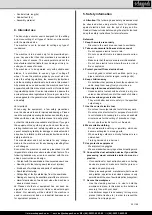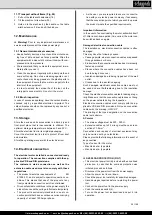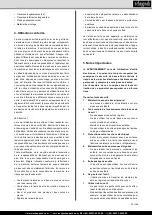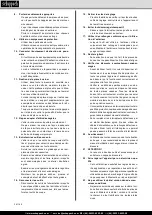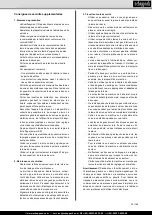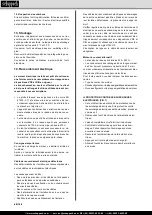
www.scheppach.com
+(49)-08223-4002-99
+(49)-08223-4002-58
29 І 168
www.scheppach.com
+(49)-08223-4002-99
+(49)-08223-4002-58
11.1 Transport without frame (Fig. 24)
1. Pull out the table width extension (14).
2.
Tilt the machine to its wheels (32).
3.
Hold on to the machine by the handle on the table
width extension (14) and pull it behind you.
12. Maintenance
m
Warning!
Prior to any adjustment, maintenance or
service work disconnect the mains power plug!
12.1 General maintenance measures
•
Keep all safety devices, air vents and the motor hous
-
ing free of dirt and dust as far as possible. Wipe the
equipment with a clean cloth or blow it down with com-
pressed air at low pressure.
•
We recommend that you clean the equipment imme
-
diately after you use it.
•
Clean the equipment regularly with a damp cloth and
some soft soap. Do not use cleaning agents or sol-
vents; these may be aggressive to the plastic parts in
the equipment. Ensure that no water can get into the
interior of the equipment.
•
In order to extend the service life of the tool, oil the
rotary parts once monthly. Do not oil the motor.
12.2 Brush inspection
In case of excessive sparking, have the carbon brushes
checked only by a qualified electrician. Important. The
carbon brushes should not be replaced by anyone but a
qualified electrician.
13. Storage
Store the device and its accessories in a dark, dry and
frost-proof place that is inaccessible to children. The
optimum storage temperature is between 5 and 30˚C.
Store the electrical tool in its original packaging.
Cover the electrical tool in order to protect it from dust
and moisture.
Store the operating manual with the electrical tool.
14. Electrical connection
The electrical motor installed is connected and ready
for operation. The connection complies with the ap-
plicable VDE and DIN provisions.
The customer‘s mains connection as well as the
extension cable used must also comply with these
regulations.
•
The product meets the requirements of EN
61000-3-11 and is subject to special connection con
-
ditions. This means that use of the product at any
freely selectable connection point is not allowed.
•
Given unfavorable conditions in the power supply the
product can cause the voltage to fluctuate temporarily.
•
The product is exclusively intended for use at con
-
nection points that have a continuous current-carrying
capacity of at least 100 Amper phase.
•
As the user, you are required to ensure, in consulta
-
tion with your electric power company if necessary,
that the connection point at which you wish to operate
the product meets the specified requirements.
Important information
In the event of an overloading the motor will switch itself
off. After a cool-down period (time varies) the motor can
be switched back on again.
Damaged electrical connection cable
The insulation on electrical connection cables is often
damaged.
This may have the following causes:
•
Passage points, where connection cables are passed
through windows or doors.
•
Kinks where the connection cable has been improperly
fastened or routed.
•
Places where the connection cables have been cut
due to being driven over.
•
Insulation damage due to being ripped out of the wall
outlet.
•
Cracks due to the insulation ageing.
Such damaged electrical connection cables must not
be used and are life-threatening due to the insulation
damage.
Check the electrical connection cables for damage regu-
larly. Make sure that the connection cable does not hang
on the power network during the inspection.
Electrical connection cables must comply with the ap
-
plicable VDE and DIN provisions. Only use connection
cables with the marking „H05VV-F“.
The printing of the type designation on the connection
cable is mandatory.
AC motor
•
The mains voltage must be 220 - 240 V~
•
Extension cables up to 25 m long must have a cross-
section of 1.5 mm
2
.
Connections and repairs of electrical equipment may
only be carried out by an electrician.
Please provide the following information in the event of
any enquiries:
Type of current for the motor
•
Machine data - type plate
•
Machine data - type plate
m
OVERLOAD PROTECTION (FIG.7)
• This electrical power tool is provided with an overload
protection. In case that the overload protection was
initiated, proceed as follows:
•
Disconnect the power tool from the power supply.
• Allow the power tool to cool down.
•
Check the power tool carefully for possible damages.
• Have damages repaired before re-starting the power
tool.
•
Connect the power tool to the power supply.
•
Push the overload switch (k).
• Turn on the power tool as described and put it into
operation.









